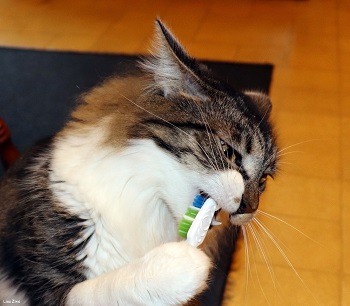
Below, we’ve put together reviews on the best cat toothbrushes we could find. We have options for the budget-conscious and those who want a premium toothbrush.
Hopefully, these reviews and our guide help you choose a toothbrush that will suit your needs.
This post has been fact-checked by one of our licensed veterinarians, but the views and opinions expressed are not necessarily their own. We recommend contacting your veterinarian before purchasing any product from this list.
A Quick Glance at the Winners in 2024
| Image | Product | Details | ||
|---|---|---|---|---|
| Best Overall |

|
Virbac C.E.T. |
|
CHECK PRICE |
| Best Value |
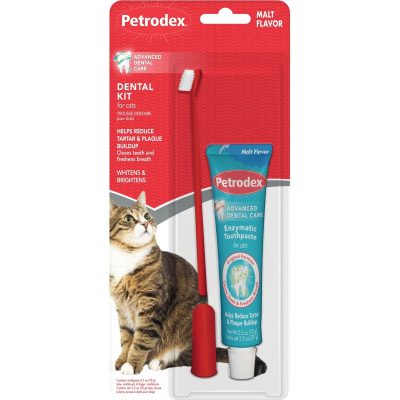
|
Sentry Petrodex |
|
CHECK PRICE |
| Premium Choice |
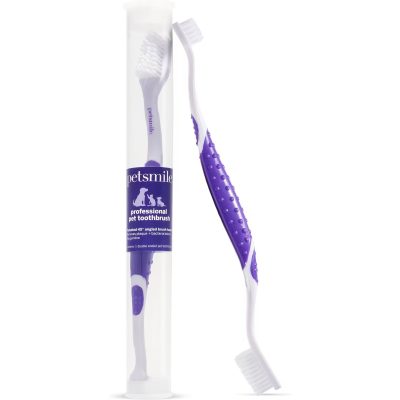
|
Petsmile Professional Dog & Cat Toothbrush |
|
CHECK PRICE |
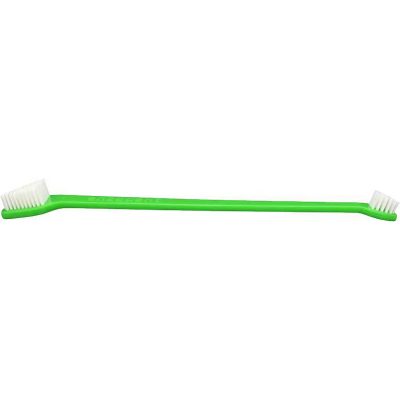
|
Vetoquinol Enzadent |
|
CHECK PRICE | |
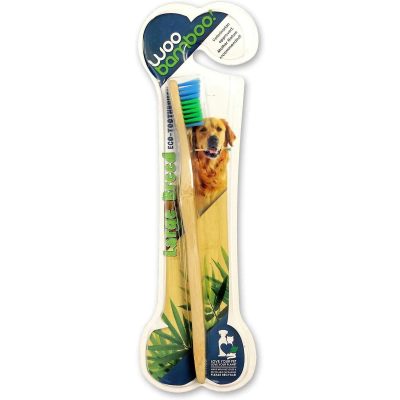
|
Woobamboo |
|
CHECK PRICE |
The 10 Best Cat Toothbrushes
1. Virbac C.E.T. Pet Toothbrush – Best Overall

Cleaning a cat’s teeth is not always going to be an enjoyable job. The more you work with your cat, the easier it should get. Luckily, a toothbrush like the Virbac C.E.T. Pet Toothbrush will make this process a bit easier. Virbac is not new to the cat dental care game; they have been developing quality products for over 25 years. If you are wondering what C.E.T. stands for, we have the answer: Clean. Every. Tooth.
If you are worried about the quality or the safety of a dental product for your cat, the Virbac should put you at ease. The Virbac brush has soft bristles you can use on your cat every day of the week with no risk of damaging their gums.
Another issue you can run into with cat toothbrushes is the size. Sometimes, the brush size does not seem to match the size of your cat’s teeth. This can make for a very uncomfortable experience for your cat. The Virbac brush is created especially for your cat, and you will not have to worry about this problem.
The Virbac toothbrush comes in various colors, and you won’t know which one you are getting until it arrives. This long-handled brush is perfectly angled to reach all areas of your cat’s mouth. The Virbac has earned a spot as the best overall cat toothbrush for its price and convenience.
- Fair pricing
- Long-standing quality product
- Easy to reach difficult areas
- Built specifically for smaller mouths
- Cannot choose the color, ships randomly
2. Sentry Petrodex Veterinary Strength Dental Care Kit – Best Value
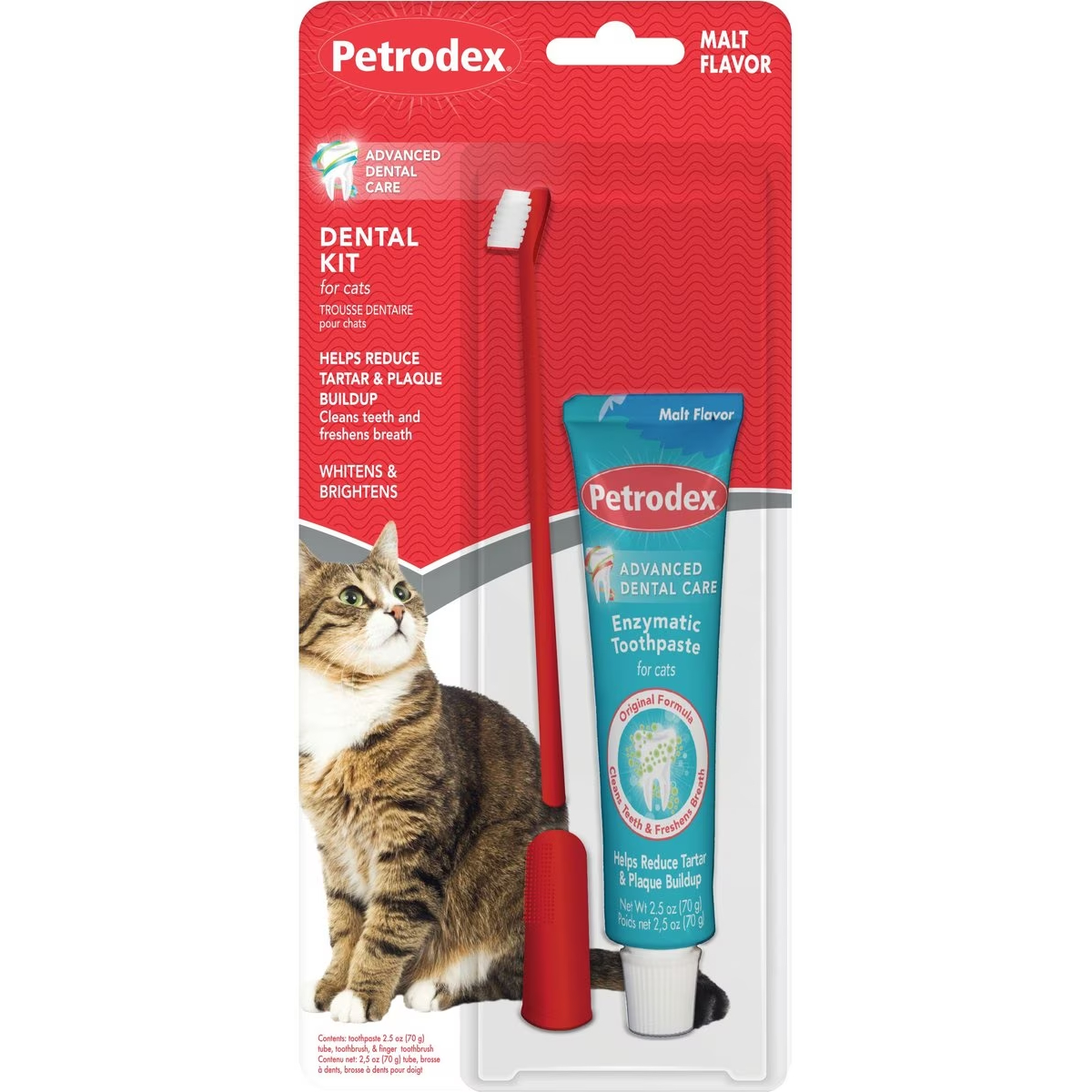
At first glance, you may think that the Sentry Petrodex is priced slightly higher than the Virbac toothbrush. When you look closer, you will realize it’s a kit with toothpaste and a toothbrush. This makes the Sentry Petrodex the best cat toothbrush for the money.
The easy-to-use toothbrush and toothpaste combo will help get rid of leftover food and plaque. This soft-bristled toothbrush is designed to be gentle and pleasing to your cat. It’s so soft that it is safe to use for kittens.
In addition to the toothbrush and toothpaste, you also get a finger brush. The finger brush is great for beginners and also an excellent way to massage your cat’s gums and ensure they stay clean and healthy. Ensure to carefully follow the recommendations for how much toothpaste to use while cleaning your cat’s teeth.
- Package set
- Great value
- Easy to use, perfect size for all ages
- Some cats do not like the toothpaste
3. Petsmile Professional Dog & Cat Toothbrush – Premium Choice
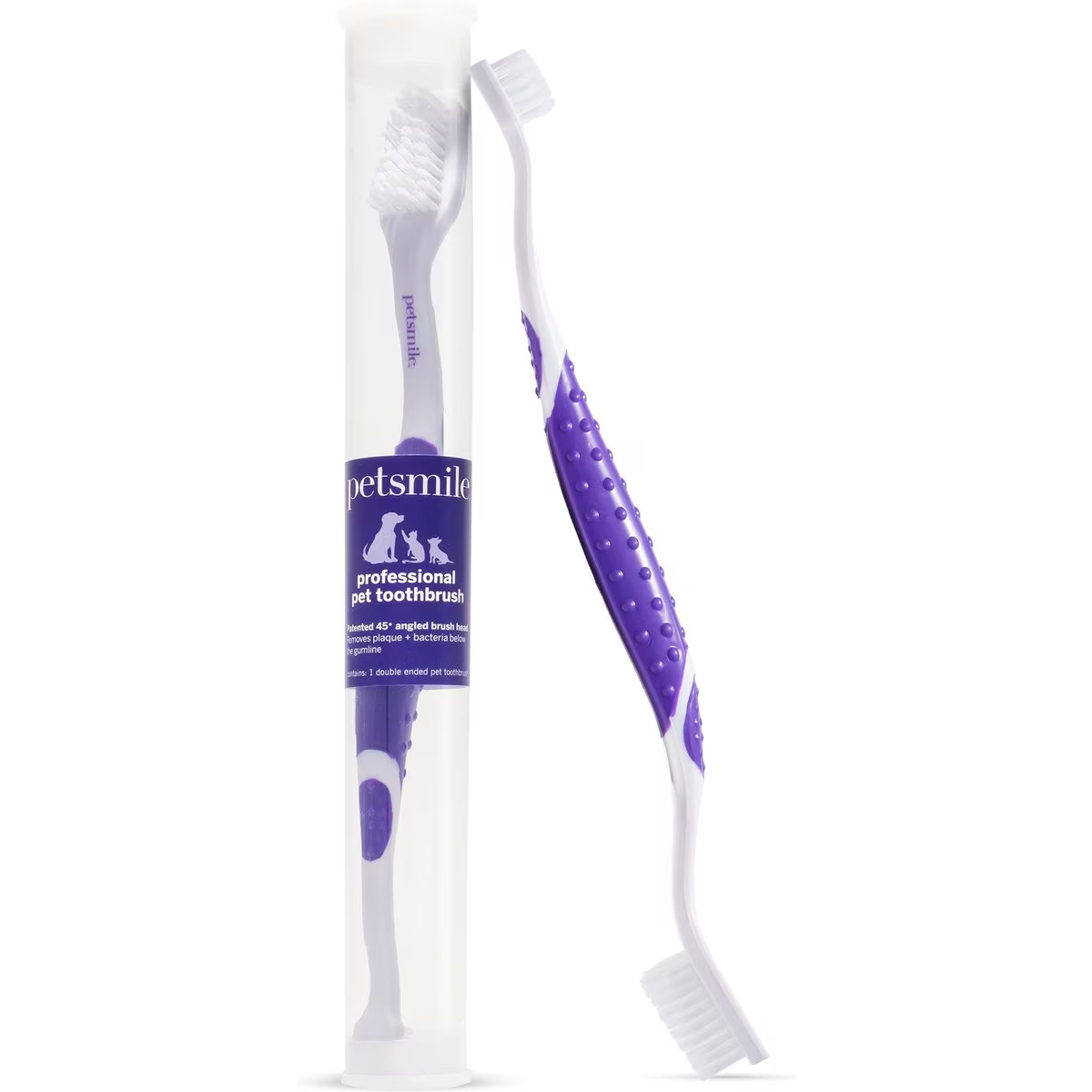
If you are one of the cat owners that want the top of the line product for their cat, we have an option for you. The Petsmile Professional Dog & Cat Toothbrush is a unique solution that should make brushing your cat’s teeth painless for you and your four-legged friend.
This dual-headed toothbrush is angled at 45 degrees to clean the gums and teeth. The Petsmile brush will cost you a few extra dollars, but it can save you time and frustration. The Petsmile is an excellent cat toothbrush, and the only thing that kept it out of our top spot was the pricing.
- Double-headed design
- Features a grip to help you stay in control
- The 45-degree angle helps get the gums clean
- Expensive
4. Vetoquinol Enzadent Dual-Ended Cat Toothbrush

Next on our list is the Vetoquinol Enzadent Dual-Ended Toothbrush. What we love about this brush is that it has two different heads. Sometimes, you need different sizes to get to specific areas of your cat’s mouth. Both heads are set on an angle to help you reach inside even the most challenging areas. The gum line is so important when cleaning a cat’s teeth, and the Enzadent brush does a very good job of cleaning it.
It features soft bristles to ensure that your cat’s mouth is not irritated by the brushing.
The only real complaint customers had about this toothbrush is that the handle is too long
- Comes with two heads — large and small
- Soft bristles
- Works well on the gum line
- The handle is too long for most cats
5. Woobamboo Cat Toothbrush
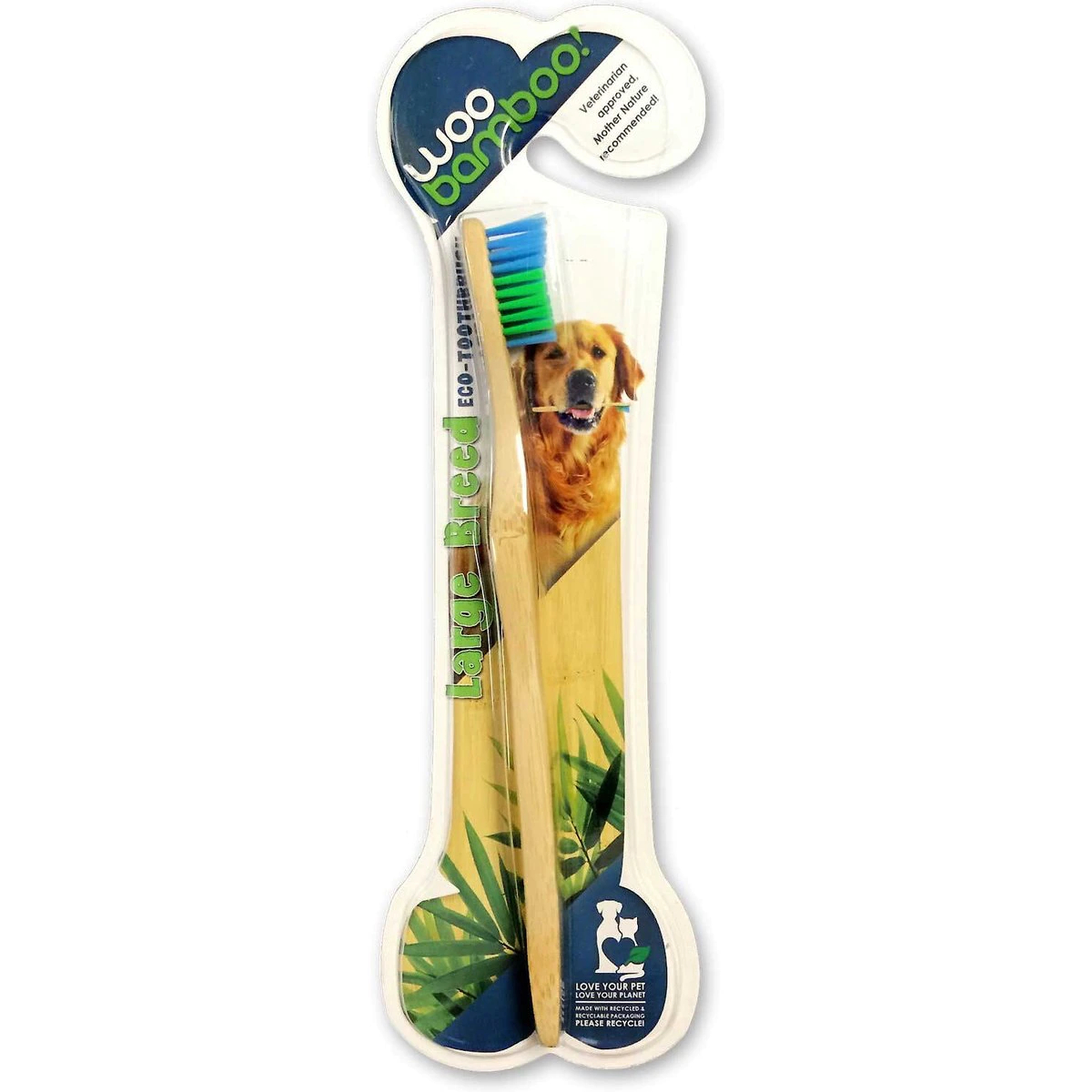
The Woobambo toothbrush is designed for cats and dogs. There are some things we love about this brush and a few things we don’t. We love that it’s made with organic and biodegradable bamboo. A natural, non-toxic wax covers the toothbrush to protect it. Woobambo recommends using the stick as a toy once you remove the bristles when they are worn out, but we advise against this.
This toothbrush is the first on our list to consider your hand while brushing your pet’s teeth. The handle is designed with a hump that gives you a comfortable grip while cleaning your cat’s teeth. The Woobambo is available in small and large sizes, but we strongly recommend getting the small for your cat.
The biggest downside to the Woobambo is that it is not specifically designed for cats, and it’s slightly larger than some other brands we have reviewed. If you have a large cat, the Woobambo could work out just fine. You may want to look into other brands if your cat is smaller or a kitten.
- Made with organic material
- Can be recycled once used
- Available in two sizes
- Not explicitly made for cats
- The brush is a little larger
- The angle is not quite perfect for gum cleaning
6. PetzLife Finger Cat Toothbrush
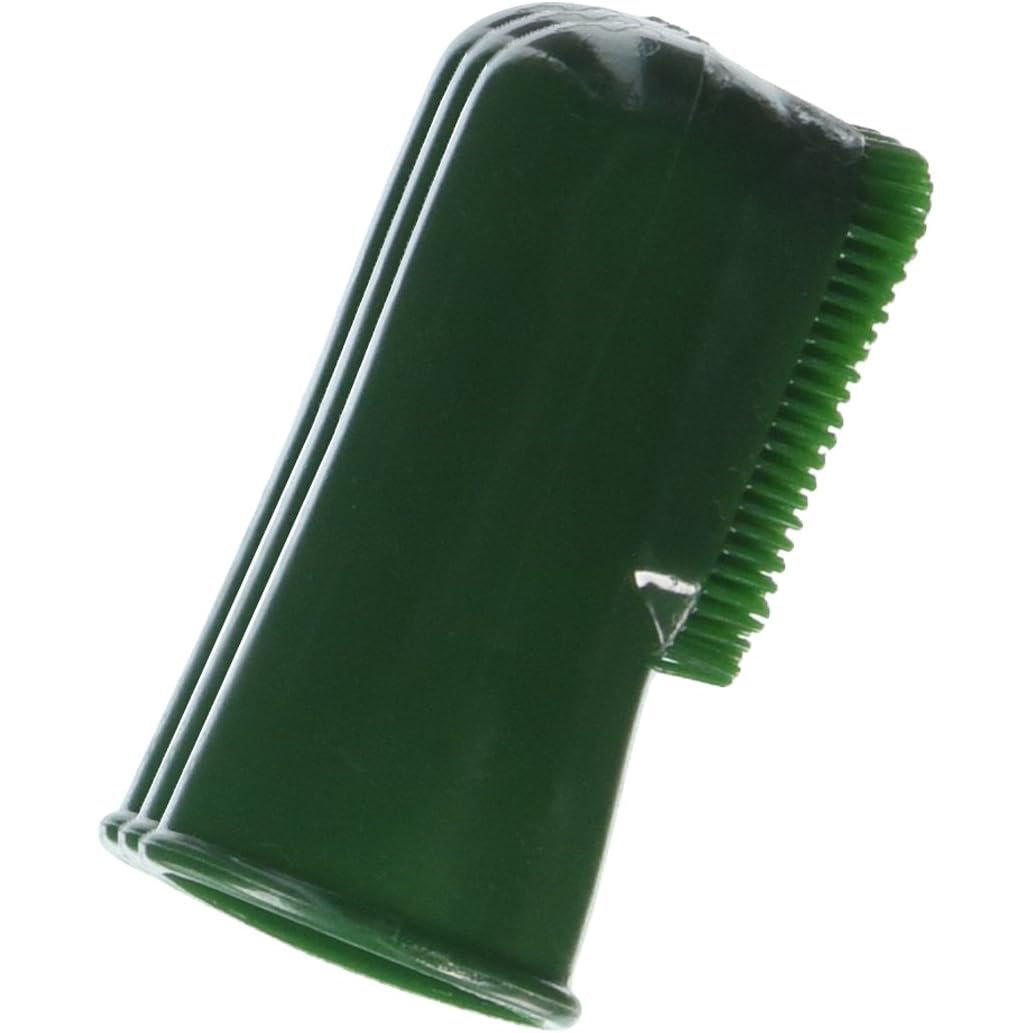
If you trust your cat enough to clean their mouth from the inside, then you will enjoy the PetzLife’s Finger Brush. Many people don’t realize that a cat’s teeth are primarily below the gum line. This makes cleaning the gums and the gum line extremely important. A finger brush can be the best way to do this.
With the PetzLife Finger Brush, you can clean and massage the gum line by simply putting the brush over your index finger. You then move your finger around in your cat’s mouth and ensure you hit all the plaque on their teeth.
There is a gel that PetzLife recommends using in addition to the finger brush, but any other toothpaste will work to clean the teeth. The only real problem with the PetzLife Finger Brush is that you have to have your finger in your cat’s mouth, and the brush is hard to clean when you are finished using it. If you are okay with these two flaws, the PetzLife could be the brush for you.
- Helps to clean the gums
- Could be useful for cats afraid of the toothbrush
- Great for beginners
- Challenging to clean when finished using
7. Pet Republique Cat Dual-Head Toothbrush
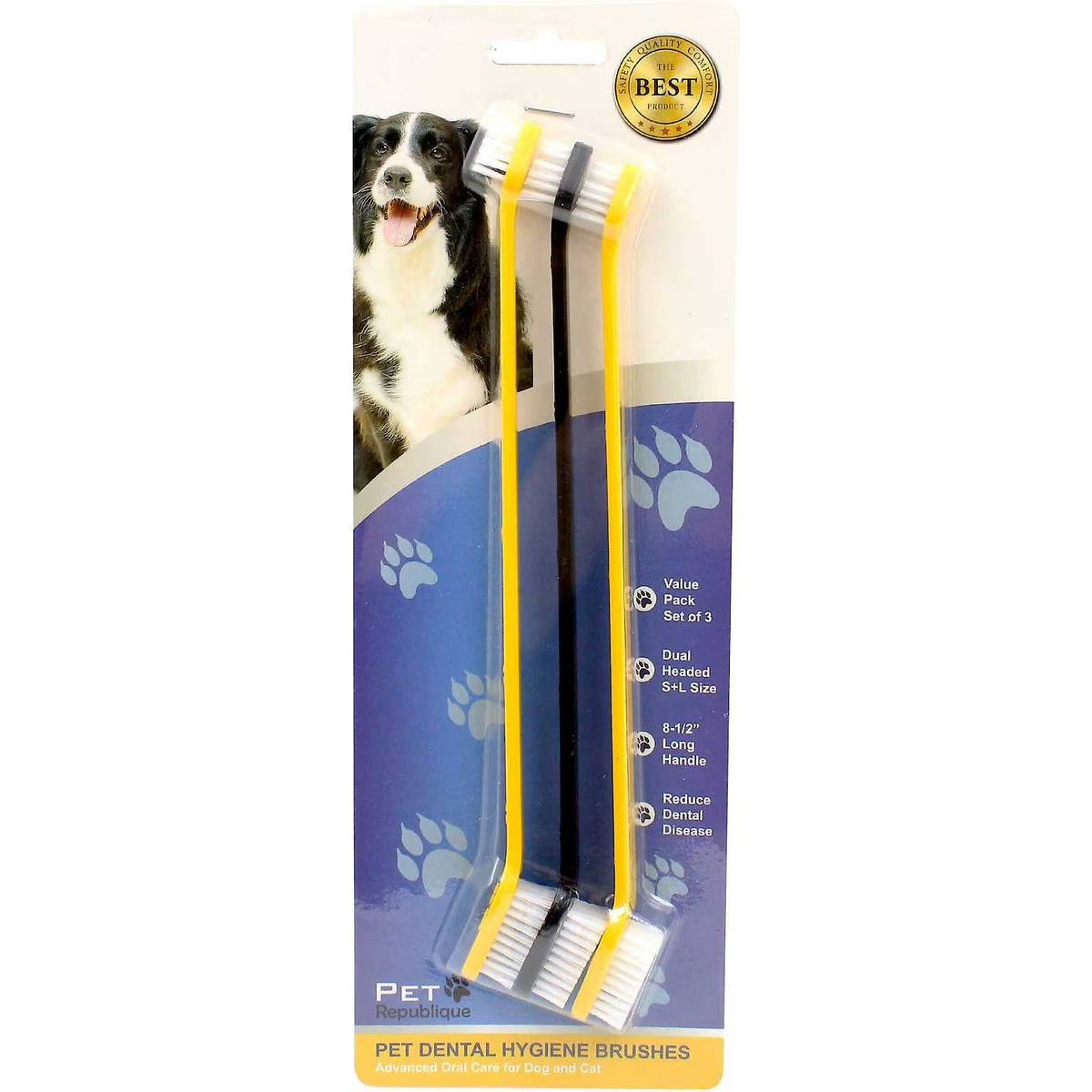
Next on our list is another dual-head option made by Pet Republique. It is made with high-quality material and is 8.5 inches long. If you want to keep your hands far away from your cat’s teeth while brushing, the Pet Republique is a good option.
Each time you purchase one of the toothbrushes, 15% of your profits are donated to the American Animal Rescue Society. That could be partially why the toothbrush is priced slightly higher than others. At least your money will be going to a good cause.
The texture of the bristles on this brush is medium. We would not recommend using this brush on a kitten or a cat that struggles with teeth brushing. If, however, you have a middle-aged cat that struggles with plaque buildup, the Pet Republique is a good choice.
The two heads are different sizes to help with generalized and detailed cleaning. Although there are plenty of good features with this toothbrush, the quality of the materials used stands out to us as a bit of a problem. The brush bends quite easily while brushing, and even though the bristles are stated to be medium in strength, they seem a bit weak.
- Dual-headed brush
- The smaller size works well for cats
- Not made with quality materials
- Bristles don’t scrub well
- The brush tends to bend
8. Nylabone Advanced Oral Care Cat Dental Kit
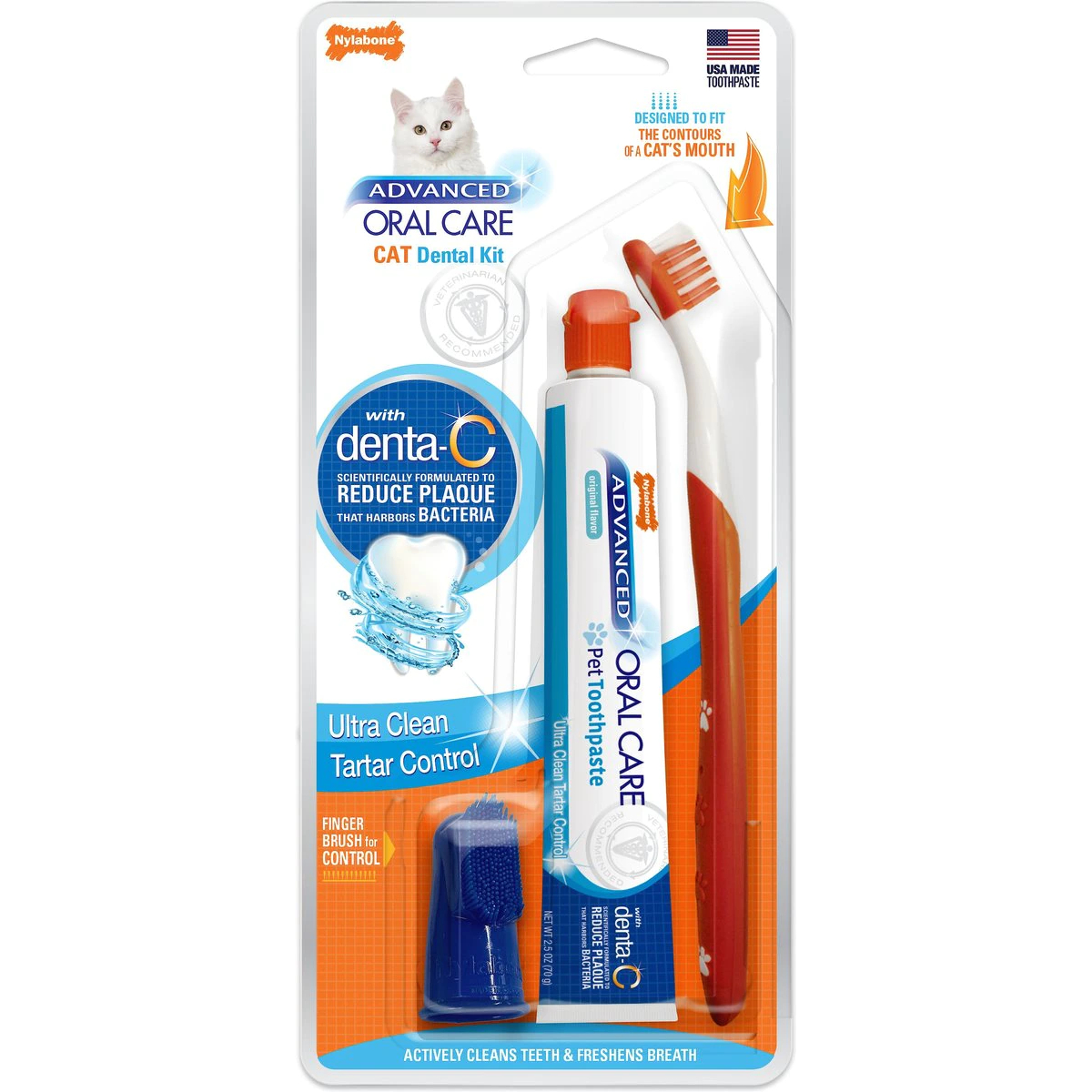
The Nylabone Advanced Oral Care Cat Dental Kit is a complete kit that includes a toothbrush, toothpaste, and a fingerbrush. The toothbrush has ultra-soft nylon tips. Overall, this is an excellent kit if you want to buy everything all at once.
We have a few issues with the Nylabone, and mostly, it has to do with size. The fingerbrush and toothbrush are just a little too big. The kit looks small in the pictures, but when you receive the product, it is pretty large. If you have a larger cat, it could be fine. But if not, you may have an issue.
The toothpaste with the Nylabone kit is hit or miss among cats. Some like the taste, and others turn away when you bring the product near them. This may be more of a personal preference than a defect.
- Sold as a kit
- Reasonable price for multiple products
- Brushes are very big
- Some cats dislike the toothpaste
9. RYERCAT Dual Sided Cat Toothbrush
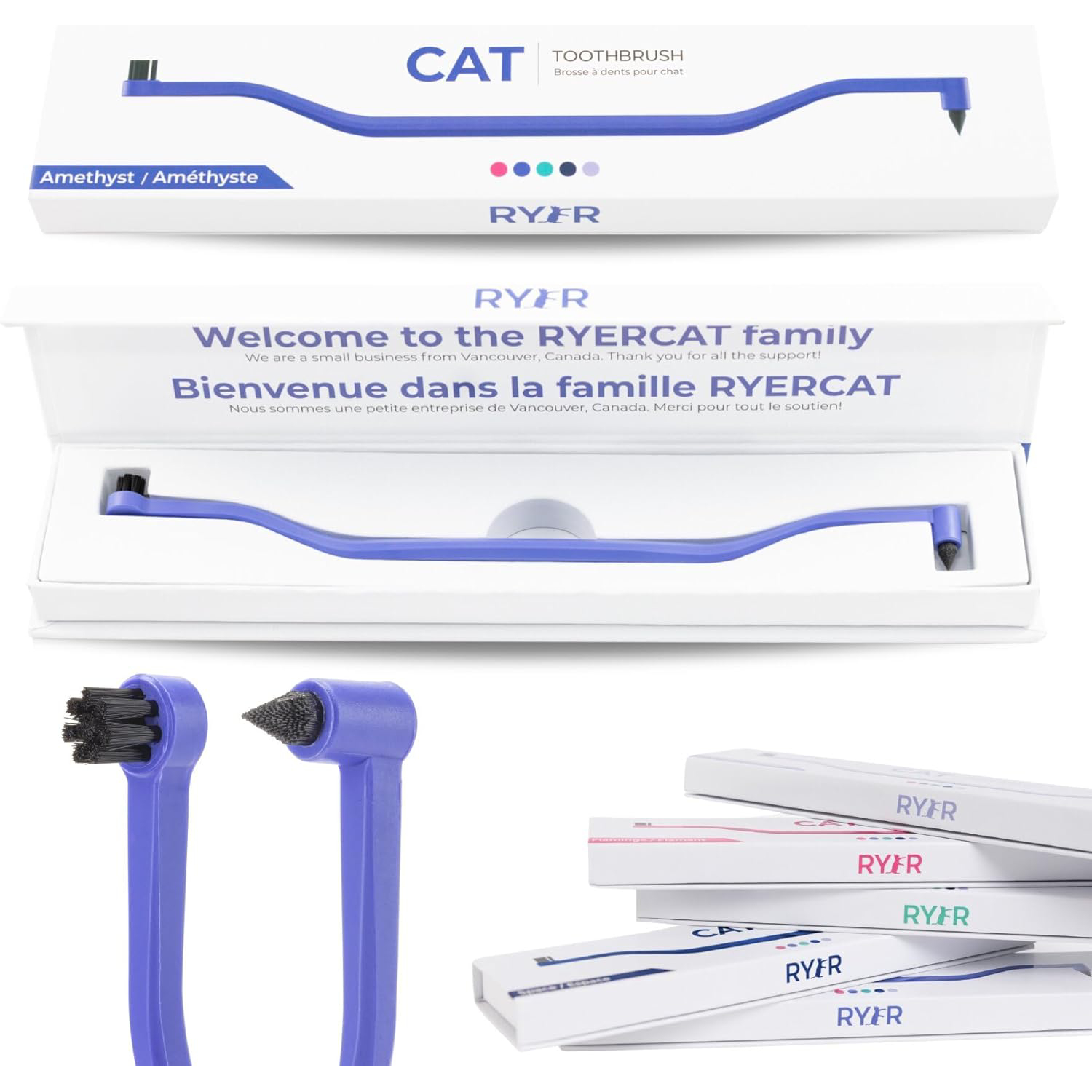
The RYERCAT Dual Sided Cat Toothbrush is a dual-headed cat toothbrush. We love the fact that it is made specifically for cats and is made of sustainable cornstarch. It has two different shaped heads, each of them featuring bristles made of different materials: nylon and bamboo. You can use between more than six different colors, and its microsized brush will likely fit any size of cat.
- Microsized brush
- Two different shaped heads
- Comes in different colors
- Expensive
10. Pet Republique Cat Finger Toothbrush
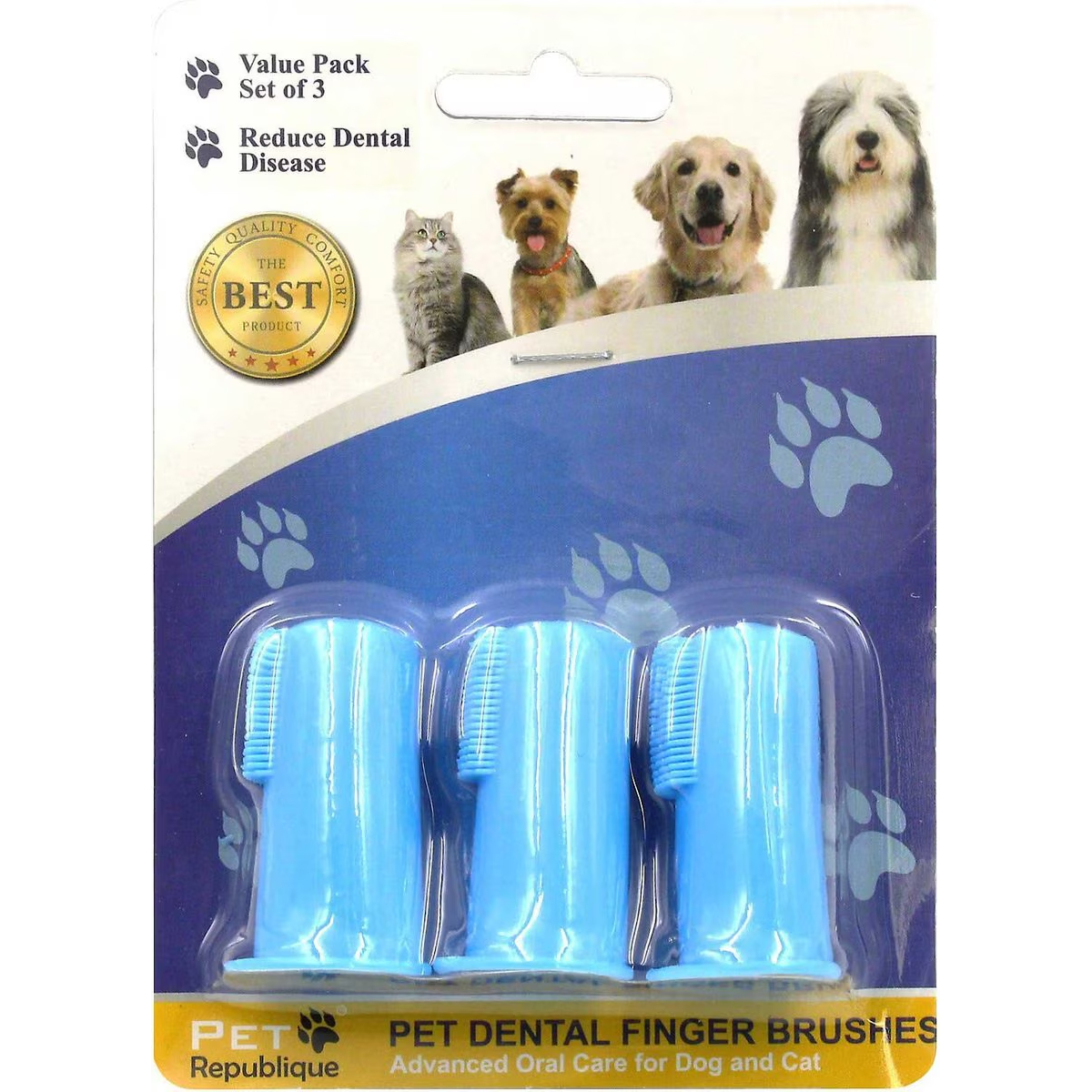
Last on our list of the best cat toothbrushes is the Pet Republique Cat Finger Toothbrush. This fingerbrush has bristles on one end to help you clean and treat your cat’s gums. The concept here is a good one, but it doesn’t work well for those with larger fingers.
The Pet Republique toothbrushes are sold in three or six-packs, and we like that you can dispose of them more frequently. The real problem is that your finger is barely protected. If your hands are small enough to fit in your cat’s mouth and complete the job, you expose yourself to a potential cat bite.
- Comes in a 3 or 6 pack
- Not enough coverage on the finger
- Does not work well for people with larger hands
- Bristles are not that effective
Buyer’s Guide: How to Choose the Best Cat Toothbrush
There are a few critical factors that you should consider before purchasing a toothbrush. We know they are not expensive items, but we don’t want you to be stuck with a pile of the ones that didn’t work for you.
Styles
There are three basic styles of cat toothbrushes: a standard single-head toothbrush, a dual-head toothbrush, and a finger brush.
- Single Head Toothbrush: Similar to a traditional style toothbrush for humans, the bristles are usually angled to help appropriately clean a cat’s gums
- Dual-Head Toothbrush: This toothbrush has two heads of different sizes, usually coming with one smaller head and one larger head
- Finger Brush: This will fit right on your finger, and you can use it to scrub your cat’s teeth while your finger is protected
Length
You will notice that toothbrushes come in a variety of lengths. Many owners like keeping a few inches between their cat’s teeth and their hands. The longer brushes are good when they are made from quality material. A long toothbrush made with a lower-quality material will likely bend and wobble as you are brushing. This can make it harder to clean your cat’s teeth.
Toothbrush Size
Specially made for cats, toothbrushes have very small heads, and some made for cats and dogs can be a little too large. Make sure you carefully analyze the size of the toothbrush head to ensure it will comfortably fit in your cat’s mouth.
Bristle Strength
Most cat toothbrushes are made with soft or medium bristles. Brushing your cat’s teeth is something that you need to do often. If you use an abrasive toothbrush, it can cause damage to the gums. You must find the right mix of soft and effective that works for your cat. Sometimes, a bristle is so soft that it doesn’t remove the plaque from your cat’s teeth.
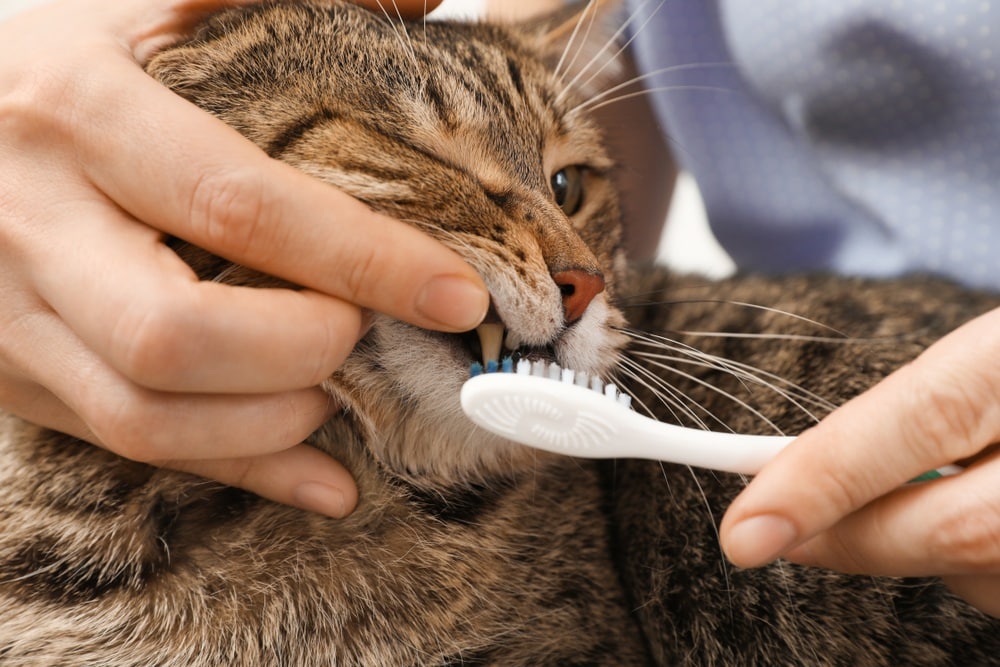
Image Credit: New Africa, Shutterstock
Price
Most toothbrushes are around $5.00. Some cost more, but it is an average price to keep in mind when looking for a toothbrush for your cat. The more expensive toothbrushes have different features. Our premium choice, the Petsmile Professional, with its angled bristles and dual head, is great at removing debris and plaque from teeth and gums.
Toothpaste or No Toothpaste
Using toothpaste on your cat’s teeth is an essential part of the toothbrushing experience, but you should never use human toothpaste or baking soda. Your cat needs a toothpaste that is specifically designed for cats. If you do not have any toothpaste, it is fine to brush your cat’s teeth without it, but never substitute it with human toothpaste. There are several toothpaste flavors and brands, and you should be able to find one that has a taste your cat can tolerate.
How Often to Replace?
You should be brushing your cat’s teeth every day. We know this is probably not realistic for all cat owners, but at minimum, you should brush them four or five times weekly. If you are brushing as often as you should be, the bristles on the toothbrush will likely only last a few months. On average, you must replace your cat’s toothbrush every 3 months.
Final Verdict
Hopefully, our reviews and buying guide have helped you determine which toothbrush will work best for you and your kitty. The Virbac C.E.T Cat Toothbrush stands out to us as the best toothbrush this year. With the Virbac, you get a quality angled brush that is the perfect size for your cat, all at a fair price.
If you are looking for an affordable toothbrush, you may want to go with the Sentry Petrodex cat toothbrush. It is a value pack that comes with a toothbrush, toothpaste, and a finger brush.
Regardless of the cat toothbrush you choose, make sure you use it as often as possible!
Featured Image Credit By: Lisa Zins, flickr
Contents
- A Quick Glance at the Winners in 2024
- The 10 Best Cat Toothbrushes
- 1. Virbac C.E.T. Pet Toothbrush – Best Overall
- 2. Sentry Petrodex Veterinary Strength Dental Care Kit – Best Value
- 3. Petsmile Professional Dog & Cat Toothbrush – Premium Choice
- 4. Vetoquinol Enzadent Dual-Ended Cat Toothbrush
- 5. Woobamboo Cat Toothbrush
- 6. PetzLife Finger Cat Toothbrush
- 7. Pet Republique Cat Dual-Head Toothbrush
- 8. Nylabone Advanced Oral Care Cat Dental Kit
- 9. RYERCAT Dual Sided Cat Toothbrush
- 10. Pet Republique Cat Finger Toothbrush
- Buyer’s Guide: How to Choose the Best Cat Toothbrush
- Final Verdict












